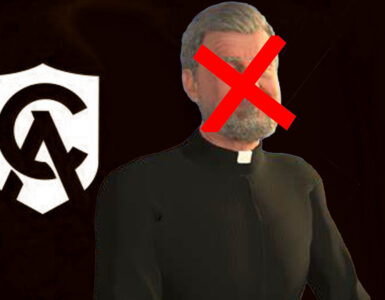(Image: Journey to Bethlehem by Daniel Rodgers)
As the Church concludes the holy season of Advent, it is opportune for us to meditate upon the difficult circumstances of the Holy Family on the eve of the first Christmas. For this, we again turn to the revelations to the 17th-century Spanish nun, Ven. Maria of Agreda. Her extensive writings, known to us as The Mystical City of God, served as the record of the revelations which she received from the Blessed Virgin herself on the mystery of salvation and her hidden life as the Mother of our Divine Savior. Today’s article focuses on the five-day journey of Mary and Joseph from Nazareth to Bethlehem.
The Mystical City of God is available in print edition in English as well as online. All text below (in italics) is from Volume II (The Incarnation), Book Two, Chapter IX. It describes the magnificent celestial procession of angels which accompanied and guarded Joseph and Mary on their trek south from Galilee into Judea. We also see that the Holy Family kept to itself as far as possible, except for the inevitable interactions with various people each evening as Joseph sought suitable lodging for his pregnant wife. We gain a glimpse of Joseph’s anxiety and dismay in his nightly search for a room, which culminated in his rejection at more than fifty places in Bethlehem itself before, as a desperate last resort, he settled for a rude cave outside the city walls.
The previous chapter (VIII) describes the decree of Caesar Augustus directing an imperial census and its impact on the Holy Family. Joseph, distraught at being suddenly required to travel some 90 miles to Bethlehem to comply with the Roman edict, did not want to leave his wife under any circumstances, especially with her delivery so near. Yet he feared the dangers of the winter journey for her and the possibility of her having to give birth in some unknown and difficult place. Meanwhile, the Blessed Virgin, although aware of the divine prophecy that mandated the birth of her Child in Bethlehem, said nothing of this to her husband. The chapter is a touching short story on the nature of love and obedience in a marriage blessed by God and under His providence.
*****
The most pure Mary and the glorious Saint Joseph departed from Nazareth for Bethlehem alone, poor and humble in the eyes of the world. None of the mortals thought more of them than what was warranted by their poverty and humility. But oh, the wonderful sacraments of the Most High, hidden to the proud, and unpenetrated by the wisdom of the flesh! They did not walk alone, poor or despised, but prosperous, rich and in magnificence. They were most worthy of the immense love of the eternal Father and most estimable in His eyes. They carried with them the Treasure of heaven, the Deity itself. The whole court of the celestial ministers venerated them. All the inanimate beings recognized the living and true Ark of the Testament (Josue 3:16) more readily than the waters of the Jordan recognized its type and shadow, when they courteously laid open and free the path for its passage and for those that followed it. They were accompanied by the ten thousand angels, which as mentioned were appointed by God Himself as the servants of her Majesty during that whole journey. These heavenly squadrons marched along as their retinue in human forms visible to the heavenly Lady, more refulgent than so many suns. She herself walked in their midst better guarded and defended than the bed of Solomon, surrounded by the sixty valiant ones of Israel, girded with their swords (Cant. 3:7). Besides these ten thousand angels there were many others, who descended from heaven as messengers of the eternal Father to His Only-begotten made man in His most holy Mother, and who ascended from earth as their ambassadors with messages and treaties from them to the heavenly Father.
In the midst of this royal retinue, hidden from the gaze of men, most holy Mary and Joseph proceeded on their way secure that their feet would not be bruised by the stone of tribulation (Psalm 90:12), since the Lord had commanded His angels to be their defense and watchfulness. This command the most faithful ministers, as vassals of their great Queen, fulfilled with wonder and delight, seeing centered in a mere creature such great sacraments, such perfections, and immense treasures of the Divinity, and seeing in Her all this distinction united to dignity and grace far exceeding their own angelic capacity. They composed new songs in honor of the Lord, whom they saw reclining as the highest King of glory, on His throne of gold (Cant. 3:9); and in honor of the heavenly Mother, who was like His living and incorruptible chariot, or like the fertile ear of corn of the promised land, enclosing the living grain (Lev. 23:10) or like the rich merchant ship, which brings the grain to the house of bread, in order that dying in the earth it might be multiplied for heaven (John 12:24). Their journey lasted five days, for on account of the pregnancy of his Spouse, Saint Joseph shortened each day’s journey. The sovereign Queen experienced no darkness of night on the way; for a few times, when their travel extended beyond nightfall the holy angels spread about such effulgence as not all the lights of heaven in their noontide splendor would have thrown forth in the clearest heavens. This light and vision of the angels also Saint Joseph enjoyed at those times; then all of them together would form celestial choirs, in which they and the two holy travelers alternated in singing wonderful hymns and canticles of praise, converting the fields into new heavens. During this whole journey the Queen was rejoiced by the sight of her resplendent ministers and vassals and by the sweet interior conversation held with them.
With these wonderful favors and delights, however, the Lord joined some hardships and inconveniences, which the divine Mother encountered on the way. For the concourse of people in the taverns, occasioned by the imperial edict, was very disagreeable and annoying to the modest and retiring Virgin-Mother and her spouse. On account of their poverty and timid retirement they were treated with less hospitality and consideration than others, especially the well-to-do; for the world judges and usually confers its favors according to outward appearance and according to personal influence. Our holy pilgrims were obliged repeatedly to listen to sharp reprimands in the taverns, at which they arrived tired out by their journey, and in some of them they were refused admittance as worthless and despicable people. Several times they assigned to the Mistress of heaven and earth some corner of the hallway, while at others She did not fare even so well, being obliged to retire with her husband to places still more humble and unbecoming in the estimation of the world. But in whatever places She tarried, how contemptible so ever it might be considered, the courtiers of heaven established their court around their supreme King and sovereign Queen. Immediately they surrounded and enclosed them like an impenetrable wall, securing the bridal chamber of Solomon against the terrors of the night. Her most faithful spouse Joseph, seeing the Mistress of heaven so well guarded by the angelic hosts, betook himself to rest and sleep; for to this She urged him on account of the hardships of travel. She, however, continued her celestial colloquies with the ten thousand angels of her retinue.
Solomon, in the Canticles, describes in diverse metaphors and similitudes many great mysteries of the Queen of heaven, but in the third chapter he refers more particularly to what happened to the heavenly Mother in her pregnancy and during this journey. During this time was fulfilled to the letter all that is said of the couch of Solomon (Cant. 3:7), of his chariot and of his golden bed, of the guard, which was stationed around it enjoying the divine vision; also, all the other sayings, which are contained in those prophecies. What I have pointed out will suffice to make them understood, and they should excite our admiration of the wonderful sacraments of God’s activity for the good of man. Who is there among mortals whose heart is not softened? Or who is so proud as not to be abashed? Or so careless as not to be filled with wonder at such miraculous extremes? The infinite and true God hidden and concealed in the virginal womb of a tender Maiden, full of grace and beauty, innocent, pure, sweet, pleasing and amiable in the eyes of God and of men, surpassing all that the Lord God has ever or shall ever create! To see this great Lady, bearing the treasure of the Divinity, despised, persecuted, neglected, and cast out by the blind ignorance and pride of the world! And on the other hand, while She is thus pushed aside into the last places, to see Her loved and esteemed by the triune God, regaled by His caresses, served by His angels, revered, defended and assisted with the greatest anxiety and watchfulness! O children of men, slow and hard of hearts! (Psalm. 4:3). How deceitful are your ways and how erroneous is your judgment in esteeming the rich and despising the poor (James 2:2), exalting the proud and humiliating the lowly, applauding the braggarts and casting out the just! Blind is your choice and full of error your judgment, and you will find yourselves frustrated in all your desires. Ambitiously you seek riches and treasures, and you find yourself in poverty beating the air; if you had received the true ark of God, you would have been blessed by the hand of the Almighty, like Obededom (2 Samuel [Kings] 6:11), but because you have treated it unworthily, many of you have experienced the punishment of Oza (2 Samuel [Kings] 6:6-7).
The heavenly Lady observed and knew the secrets of the different souls of those She met, penetrating into the very thoughts and conditions of each, whether of grace or of guilt in their different degrees. Concerning many souls, She also knew whether they were predestined or reprobate, whether they would persevere, fall, or again rise up. All this variety of insight moved Her to the exercise of heroic virtues as well in regard to the ones as to the others. For many of them She obtained the grace of perseverance, for others efficacious help to rise from their sin to grace; for others, again, She prayed to the Lord with affectionate tears, feeling most intense sorrow for the reprobate, though She did not pray as efficaciously for them. Many times, worn out by these sorrows, much more than by the hardships of travel, the strength of her body gave way; on such occasions the holy angels, full of refulgent light and beauty, bore Her up in their arms, in order that She might rest and recuperate. The sick, afflicted and indigent whom She met on the way, She consoled and assisted by asking her most holy Son to come to their aid in their necessities and adversities. She kept Herself silently aloof from the multitude, preoccupied with the Fruit of her divine pregnancy, which was already evident to all. Such was the return which the Mother of mercy made for the inhospitality of mortals.
For the greater reproach of human ingratitude, it happened also that once during these wintry days they reached a stopping-place in the midst of a cold rain and snow storm (for the Lord did not spare them this inconvenience), and they were obliged to take shelter in the stables of the animals, because the owners would not furnish better accommodation. The irrational beasts showed them the courtesy and kindness which was refused by their human fellow-beings; for they retreated in reverence at the entrance of their Maker and of His Mother, who carried Him in her virginal womb. It is true the Queen of creation could command the winds, the frost and the snow not to inconvenience Her; but She would not give such a command in order not to deprive Herself of suffering in imitation of her most holy Son, even before He came forth into the world. Therefore, the inclemencies of the weather affected Her to a certain extent. The faithful Saint Joseph, however, did his utmost to shield Her; and still more did the holy angels seek to protect Her, especially the holy prince Michael, who remained at the right side of his Queen without leaving Her even for a moment; several times, when She became tired, he led Her by the arm along the way. Whenever the Lord permitted, he also shielded Her against the weather and performed many other services for the heavenly Queen and the blessed Fruit of her womb, Jesus.
Thus, variously and wonderfully assisted, our travelers arrived at the town of Bethlehem at four o’clock of the fifth day, a Saturday. As it was at the time of the winter solstice, the sun was already sinking and the night was falling. They entered the town, and wandered through many streets in search of a lodging-house or inn for staying overnight. They knocked at the doors of their acquaintances and nearer family relations; but they were admitted nowhere and in many places they met with harsh words and insults. The most modest Queen followed her spouse through the crowds of people, while he went from house to house and from door to door. Although She knew that the hearts and the houses of men were to be closed to them, and although to expose her state at her age to the public gaze was more painful to her modesty than their failure to procure a night-lodging, She nevertheless wished to obey Saint Joseph and suffer this indignity and unmerited shame. While wandering through the streets they passed the office of the public registry and they inscribed their names and paid the fiscal tribute in order to comply with the edict and not be obliged to return. They continued their search, betaking themselves to other houses. But having already applied at more than fifty different places, they found themselves rejected and sent away from them all. The heavenly spirits were filled with astonishment at these exalted mysteries of the Most High, which manifested the patience and meekness of his Virgin Mother and the unfeeling hardness of men. At the same time, they blessed the Almighty in His works and hidden sacraments, since from that day on He began to exalt and honor poverty and humility among men.
It was nine o’clock at night when the most faithful Joseph, full of bitter and heartrending sorrow, returned to his most prudent Spouse and said: “My sweetest Lady, my heart is broken with sorrow at the thought of not only not being able to shelter Thee as Thou deservest and as I desire, but in not being able to offer Thee even any kind of protection from the weather, or a place of rest, a thing rarely or never denied to the most poor and despised in the world. No doubt heaven, in thus allowing the hearts of men to be so unmoved as to refuse us a night-lodging, conceals some mystery. I now remember, Lady, that outside the city walls there is a cave, which serves as a shelter for shepherds and their flocks. Let us seek it out; perhaps it is unoccupied, and we may there expect some assistance from heaven, since we receive none from men on earth.” The most prudent Virgin answered: “My spouse and my master, let not thy kindest heart be afflicted because the ardent wishes which the love of thy Lord excites in thee cannot be fulfilled. Since I bear Him in my womb, let us, I beseech thee, give thanks for having disposed events in this way. The place of which thou speakest shall be most satisfactory to me. Let thy tears of sorrow be turned into tears of joy, and let us lovingly embrace poverty, which is the inestimable and precious treasure of my most holy Son. He came from heaven in order to seek it, let us then afford Him an occasion to practice it in the joy of our souls; certainly, I cannot be better delighted than to see thee procure it for me. Let us go gladly wherever the Lord shall guide us.” The holy angels accompanied the heavenly pair, brilliantly lighting up the way, and when they arrived at the city gate, they saw that the cave was forsaken and unoccupied. Full of heavenly consolation, they thanked the Lord for this favor, and then happened what I shall relate in the following chapter.



